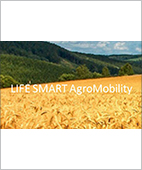
LIFE Project: Processing livestock waste for the production of biomethane for use in agricultural vehicles and biofertilizers.
- Type Project
- Status Filled
- Execution 2020 -2024
- Assigned Budget 2.291.942,00 €
- Scope Europeo
- Autonomous community Madrid, Comunidad de
- Main source of financing LIFE
- Project website Web del proyecto
LIFE SMART AgroMobility focuses on the technical, economic, and environmental viability of a new model for managing livestock waste (pig slurry) through biodigestion with innovative, low-cost biodigesters.
Unmanaged livestock waste is a significant source of diffuse emissions of methane (CH4), carbon dioxide (CO2), and nitrous oxide (N2O). According to an annual GHG report, the agricultural sector is responsible for 21% of global greenhouse gas (GHG) emissions (Food and Agriculture Organization of the United Nations, 2016).
Intensive livestock farms are the largest emitters of these gases due to the concentration of animals in confined spaces. Manure management generates approximately 230–106 tCO2e/year, with pigs responsible for 40% of these emissions. Methane and nitrous oxide are the main gases emitted in agricultural production, especially from the handling of livestock and their manure. Managing these residues through anaerobic biodigestion processes prevents the generation of these emissions, while also producing biogas that undergoes subsequent purification (upgrading) to become biofuel (biomethane). Using biomethane as fuel in vehicles, replacing conventional fossil fuels, results in a reduction of CO2e emissions (2 kg of CO2 per m3 of biomethane produced). Similarly, compressed natural gas (CNG) combustion engines have lower emissions of volatile particles and NOx than diesel engines used in agricultural vehicles and machinery.
To demonstrate the technical, economic, and environmental viability of a new model for managing livestock waste (pig slurry) through biodigestion with innovative, low-cost biodigesters. The prototype will utilize microalgae biotechnology for the upgrading and biomethane production process and will have the capacity to fuel two light vehicles.
Low-cost biodigesters for pig slurry, with a total capacity of 150 m3. They manage 2,100 m3 of slurry, generating 36 tCH4/year, avoiding the emission of 730 tCO2/year. The process saves 2.57 kgCO2e per kg of meat produced (a 42% reduction in emissions).
Prototype of a new technology (microalgae and bacteria, and simultaneous CO2 and H2S removal) for obtaining biomethane. The biological refining treatment will have a surface area of 1,500 m2 of photobioreactors for microalgae cultivation, which will treat a biogas flow rate of 80 m3/day. This flow rate corresponds to 82% of the biogas produced in the digester, the remainder being consumed to generate heat.
A new refining process (eliminating trace contaminants such as volatile organic compounds, NH3, and H2S) and biomethane compression, based on a multi-stage process. The final treatment phase produces high-purity biomethane, compressed to a pressure of 250 bar, suitable for supply to vehicles via the specially developed gas station.
Full-scale demonstration of the use of biomethane produced to fuel two types of vehicles: light-duty vehicles and tractors. Based on the biomethane produced in the previous phases, this would allow for up to 280,000 km of travel (light-duty vehicles).
Digestate (solid residue from the biodigestion process) is valuable as an organic fertilizer. The microalgae produced in the photobioreactor, due to their N and P content and the presence of phytohormones and natural fungicides, constitute a biofertilizer. Biofertilizers indirectly minimize the carbon footprint of the European agricultural sector by reducing the consumption of synthetic nitrogen fertilizers.
- Coordinator/entity name: Marcelo F. Ortega Romero
Postal address: Ramiro de Maeztu, 7, 28040, Madrid
- UNIVERSIDAD POLITéCNICA DE MADRID
- NTTDATA (NTT DATA EUROPE & LATAM GREEN ENGINEERING SL)
- COPISO(COPISO SORIA, S.C.)
- GASNAM(ASOCIACIóN IBéRICA DE GAS NATURAL Y RENOVABLE PARA LA MOVILIDAD)
- FUNGE(Fundación General de la Universidad de Valladolid)
- EREN(Ente público Regional de la Energía de Castilla y León)
- UVA(UNIVERSIDAD DE VALLADOLID)
- NGVA(Natural & bio Gas Vehicle Association)







